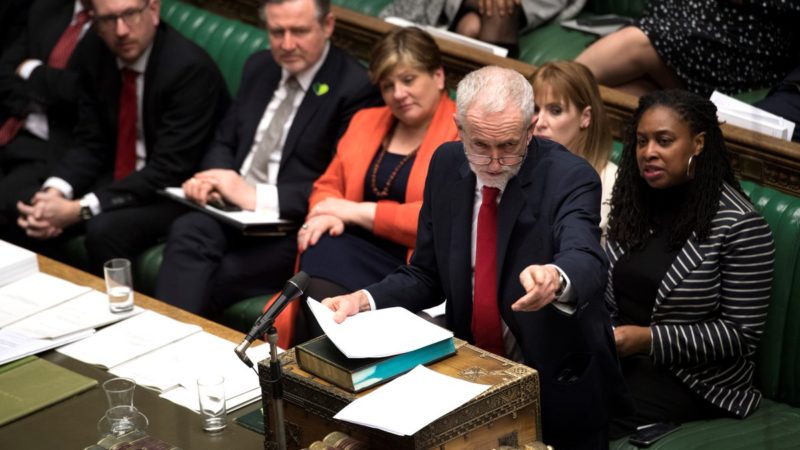
LabourList has seen the shadow cabinet briefing written by party strategists in full. The document, which is being discussed by opposition frontbenchers at a special Brexit meeting today, covers the recent local elections, European elections and current polling of voting intentions. It particularly focuses on how Brexit played a role in the results and how Labour should respond. Here are eight key points made in the report.
1. The Tories were lucky they didn’t do worse in the local elections.
“It isn’t clear what difference might have been made had the Brexit Party in particular stood large numbers of candidates, but what is certainly true is that had there been more independent and minor parties available for people to vote for the Tory losses would have been much greater.”
2. Lib Dem gains in the local elections were not down to Brexit…
“There is some correlation with areas with high percentages of 2016 Remain voting but this is at best a partial explanation of their performance. Actually the best pointer to a strong Lib Dem performance in the local elections was their electoral success in the past. Almost all of the councils where the made most of their gains were places where they had an established political and organisational presence.”
3. … but Lib Dems wins in the European elections were down to Brexit.
“Liberal Democrat support correlated strongly with Remain voting in 2016, especially when Scotland (where they were competing with the Scottish National Party for Remain votes) is not included. Brexit Party support was even more strongly correlated with Leave voting, and (positively) with 2014 UKIP support. Turnout was also correlated with Remain support, i.e. the higher the 2016 Remain vote the higher turnout tended to be.”
4. On the basis of the European election results, these are the key Remain seats to worry about.
According to the report, the top 50 local authority shares of the vote for the Lib Dems included four marginal seats that Labour needs to win at the next election: Cities of London & Westminster, Putney, Watford, Wimbledon.
4. And these are the key Leave seats to worry about.
The briefing says that the top 50 council shares of the vote for the Brexit Party include 14 Labour-held seats: Hartlepool, Great Grimsby, Ashfield, Redcar, Bolsover, Barnsley Central, Barnsley East, Penistone & Stocksbridge, Wentworth & Dearne, Dudley North, Bassetlaw, Scunthorpe, Stoke-on-Trent Central, Stoke-on-Trent North.
It also comprised three marginal seats that were lost by Labour in 2017: Mansfield, Middlesbrough South & East Cleveland and Stoke-on-Trent South.
5. Labour’s non-metropolitan vote continues to decline.
Both local and European elections provided further evidence of “instability and fragmentation of Labour’s vote in non-metropolitan Britain, including the industrial communities which comprised Labour’s heartland at least until the 1980s”, the report outlines.
It says this trend can be traced back to 1987 and 1992. However, the briefing states: “In the last three general elections, differential swings have been exacerbated, particularly with the collapse of the Lib Dems in the 2015 election.”
6. The Peterborough result suggests voters could ‘come home’ to the main parties.
“Labour’s victory in the by-election was partly thanks to an increased turnout, with 10,000 additional voters compared with the European election. Overall however some of the European election switchers must have switched back to the two major parties, a tentative indication that the European election should not be taken as a precursor of potential general election behaviour.”
7. Switching to an anti-Brexit position may not be enough to win back Remainers.
“It is not obvious, from the evidence of local elections and Peterborough, that a more “pro Remain” position from Labour would in itself win back voters currently lost to the Liberal Democrats, or in a numerical enough way that would offset Leave voters in many of the key marginals, that have lost both recently and over the last few general elections.”
8. Switching to an anti-Brexit position may not be worth the risk.
“It remains the case that there are more target and defensive seats in the Midlands and North of England which voted leave. The recent elections don’t suggest any change to this basic arithmetic, given the geographical distribution of Leave and Remain voters. There is an evident risk that shifting to a more explicitly pro-Remain position would leave us vulnerable in seats we need to hold or win without enough potential seat gains in winnable Remain majority areas.”




More from LabourList
Nudification apps facilitate digital sexual assault – and they should be banned
Diane Abbott suspended from Labour after defending racism comments
Labour campaign groups join forces to call for reinstatement of MPs